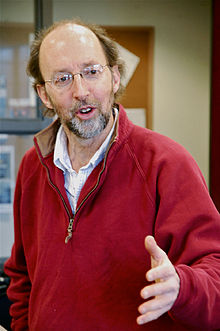Anthony Weston
| Anthony Weston | |
|---|---|

Anthony Weston in class, Spring 2012.
|
|
| Born | Spring Green, Wisconsin |
| Era | 20th / 21st-century philosophy |
| Region | Western philosophy |
| School | Pragmatism |
|
Main interests
|
Environmentalism Cultural philosophy Critical thinking Creativity Ethics |
|
Influences
|
|
Anthony Weston is an American philosopher, teacher, and writer. He is author of widely used primers in critical thinking and ethical practice and has written a variety of unconventional books and essays on philosophical topics.
Weston was born in 1954 and grew up in the Sauk County region of southwestern Wisconsin, country identified with the conservationist Aldo Leopold (in his Sand County Almanac) and the architect and visionary Frank Lloyd Wright, a strong influence on his father's family. He is a 1976 Honors graduate of Macalester College, and received his PhD in Philosophy in 1982 from the University of Michigan, where he wrote his PhD dissertation with Frithjof Bergmann on "The Subjectivity of Values". He taught at the State University of New York at Stony Brook for ten years, and subsequently in Philosophy and Environmental Studies at Elon University, where he has won the University's premiere awards for both teaching and scholarship, as well as abroad in Costa Rica, Western Australia, and British Columbia.
Weston's philosophical project as a whole advances an expansive "toolbox" for critical, creative, and constructive thinking, especially for purposes of social and environmental re-imagination and pragmatic ethical practice. The social, ethical, even ontological problems that we so often take as "given" are more often, he argues, products of underlying conditions, practices, and choices. This view may be identified with deconstruction, but too often, Weston argues,
This reconstructive project calls on a set of skills and concepts less often recognized and valued in philosophy. Inspired in particular by the pragmatic social philosophy of John Dewey, Weston envisions open-ended, generative, imaginative and experimental thinking, modeled on crafts such as building or performance and empirical science, gradually displacing more category-bound and formal thinking that tends to be more reactive and critical. In a variety of essays and books he lays out key concepts such as "the hidden possibilities of things" – the sense that the world has much more depth and possibility than it may seem – and correlatively the need to thematize and resist self-validating reduction, the process by which some being or some part of the world are reduced to less than they might be, and then that very reduction is taken as an excuse and validation for itself, the obliterated possibilities now thoroughly out of view. Correspondingly, the task of knowing and valuing is not to "read off" the nature and possibility of things off the world as it is "given", but to actively engage the world, to "venture the trust" to create new kinds of openings in interaction with the world within which deeper possibilities might emerge.
...
Wikipedia
